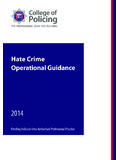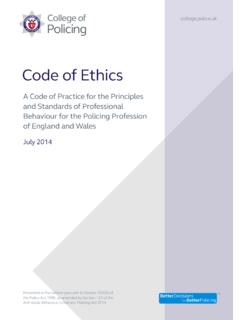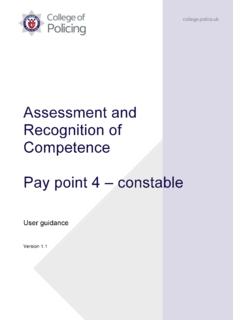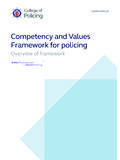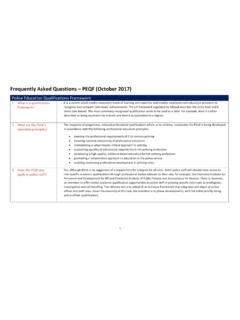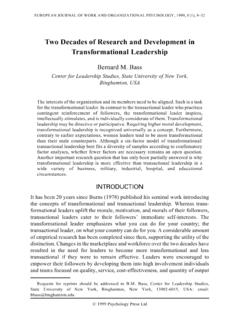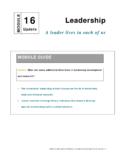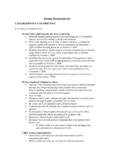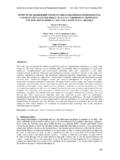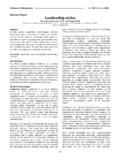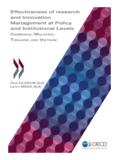Transcription of Leadership Review Recommendations for …
1 ReviewJune 2015forBetterPolicingRecommendations for delivering Leadership at all levelsCollege of Policingii1 Leadership ReviewLeadership Review College of Policing Limited (2015)This publication (excluding all images and logos) is licensed under the terms of the Non-Commercial College Licence except where otherwise stated. To view this licence visit we have identified any third-party copyright information you will need to obtain permission from the copyright holders publication is available for download at enquiries regarding this publication should be sent to us at 02by the Chair of the College of Policing 02by the Chief Executive of the College of Policing 03 Introduction Why do we need a Review ? What is the role of Leadership ? Why is this Review the College of Policing s responsibility? 072 Methodology Phases Establishing the evidence base Stakeholder engagement Views from beyond policing 113 The future context for police Leadership 124 Implications for policing 155 Supporting police leaders Key areas Improving culture 17 Recommendation 1 Addressing unintended consequences of hierarchy 22 Recommendation 2 Increasing diversity and valuing difference 24 Recommendation 3 25 Recommendation 4 28 Recommendation 5 Giving attention to both management and Leadership development 30 Recommendation 6 Recognising lateral development 32 Recommendation 7 34 Recommendation 8 Achieving greater consistency of practice across forces 36 Recommendation 9 37 Recommendation 10 396 Context for these Recommendations 40 College of PolicingCollege of Policing23 Leadership ReviewLeadership Reviewby Dame
2 Professor Shirley Pearce, Chair of the College of Policingby Alex Marshall, CEO of the College of PolicingForewordForeword Everyone working in policing deserves the very best Leadership and management at all levels in order to deliver the highest levels of service to the public. This Review builds on the strengths in policing. It identifies the challenges for the future and makes Recommendations about how we need to change in several key areas, including: culture and the need to balance the requirement for command in some operational situations with a culture of asking questions and enabling challenge embedding reflective practice, peer Review and a commitment to building a body of knowledge will enhance policing learning and practice promoting the best and increasing diversity by removing subjectivity from processes and ensuring promotion and selection are based on merit and measurable skills management and Leadership skills recognising that more attention needs to be given to management education and development, not just Leadership development reward introducing lateral progression as well as promotion.
3 In recognition that policing increasingly needs specialist skills and leaders and that status and reward do not come from rising up through a rank structure alone consistency ensuring that the Recommendations and ways of working are consistent across 43 forces wherever this is appropriate to reduce duplication, cost and to increase movement and diversity across forces. I look forward to supporting the College and working with others in the policing landscape to deliver the Recommendations . Professor Dame Shirley Pearce, Independent Chair, College of Policing The College of Policing Leadership Review makes ten Recommendations that, taken together, will equip leaders of the future with the skills and knowledge to succeed. It is relevant at all levels in policing, for both officers and staff. I do not underestimate the challenge of delivering these Recommendations .
4 While the College has a significant part to play, success in implementing the Review requires a much wider response from across the police service, police and crime commissioners and the Home Office. It is important that senior leaders set an example and that is why one of the Recommendations invites them to address their own continuing Leadership development needs. This example of personal responsibility is fundamental to increasing professionalism across policing. Implementing the Recommendations inevitably comes with a cost, but we accept that investment is crucial if we are to improve the way that our leaders are developed. It is the workforce in policing who have delivered the changes of recent years. Only by investing in and valuing the people who work in policing will we succeed in overcoming the tough challenges in the next few years.
5 Delivery of all the Recommendations may take time but, in the long term, it is essential that policing makes this investment. The College will work collaboratively across policing to implement these Recommendations and shape the future direction of police Leadership . Chief Constable Alex MarshallCollege of PolicingCollege of Policing45 Leadership Why do we need a Review ? Our police service is the envy of many around the world, respected for its strength of purpose and public service ethos. Leaders at all levels of the police can be proud of a tradition of success in handling challenging incidents on a daily basis. The police service has managed stringent budget reductions while also adapting to new developments in political accountability, patterns of crime and in the task of protecting the There is, however, a powerful need for change.
6 The future context identified in this Review demands a fundamental change in the way we equip the whole police workforce with Leadership skills and knowledge. Only by being highly adaptable, extraordinarily effective and operating from the basis of a knowledge of what works will policing maintain its reputation and continue delivering on its commitment to prevent crime and protect the public. A failure to adapt and prepare for the future means there is a serious risk that the police service will falter under twin pressures of financial constraint and declining Debate has been mounting in recent years about the structure, status and culture of policing, and many efforts have been made to identify ways to support all those working in the police to fulfil their duties while adapting to new social, economic and political realities. These efforts have met with, at best, partial success.
7 This is not due to failures of intent, diligence or commitment. Rather, they have foundered on the reality that consistent cultural and structural reform is one of the most difficult things to achieve in any single organisation, let alone in the 43 locally based, independently funded and accountable forces which, together with non-geographical organisations, comprise policing in England and The benefit of embedding consistent, professional practice that is ethically based and informed by evidence has been articulated many times. That it remains an unfulfilled goal for UK policing is in part because we still wrestle with conflicting images of policing as a profession, and as a craft: The Job . However, with the establishment of the College of Policing as the professional body, the introduction of a consistently adopted Code of Ethics, and the imperative of keeping up with external change, the opportunity to make progress towards this goal is greater than ReviewCollege of PolicingCollege of Policing67 Leadership ReviewLeadership Having described these qualities, we must guide leaders along changing career paths, recognising the need to get the best from people through appropriate support and accountability matched with realistic reward and recognition.
8 This Review found investment in Leadership development to be patchy and, in financially challenging times, training in the intangible soft skills that are vital to Leadership can be the first to be cut. Yet it is essential that we have the best possible Leadership if we are to navigate future demands successfully. A concern articulated by some is, what if you invest in developing your people and they leave? To which the response must be, what if you don t invest in them and they stay? . Why is this Review the College of Policing s responsibility? Leadership is a primary issue for a body establishing the elements of a formal profession. It sits at the heart of what it means to practise as a professional and it is the responsibility of a professional body to state what can be expected of leaders in that In its first year the College began to Review whether training and development for Leadership were being done as well as they might be given the changes affecting policing.
9 The Review had begun to investigate the structures and outcomes of Leadership programmes and to devise what future Leadership training and development might look like. It became apparent that a fundamental Review of the future requirements of police Leadership was needed, and this was the mandate adopted following a Home Secretary statement to Parliament on 22 July In conducting this Review the College has made use of the widest range of evidence available, in line with our commitment to embedding evidence-based practice. Sources ranged from academic articles and trials to workforce data and surveys, and from engagement with external organisations to consultations with the police workforce. However, in many areas current evidence is at best partial. We must accept this reality while we continue to build the evidence base, and not be afraid of basing judgements on the best available The vision of the College of Policing is to be a world-class professional body, equipping our members with the skills and knowledge to prevent crime, protect the public and secure public trust.
10 Working with and for every citizen remains fundamental to policing. It takes high levels of trust to do it well within the police service, and between the police, partner organisations and the public. That is what great Leadership The risks arising from not making progress are also greater than ever. The development of an ethical, evidence-based police profession must be applied at all levels and especially to the practice of Leadership . Not doing so will result in a failure to unlock the full potential of those working in policing that will, in turn, inhibit the police service s ability to meet the challenges of the future or provide the best service possible to the What is the role of Leadership ? Leadership can be described as the quality which connects an understanding of what must be done with the capability to achieve it.


